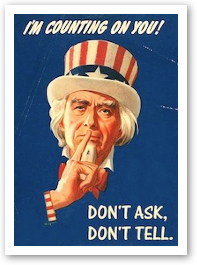Don't Ask; Don't Tell; Don't Change
- RUSSELL SHAW
The first and most important thing to understand about the gays in the military debate is that it isnt really about gays in the military.
 |
Not at bottom, at least. The fundamental issue in this argument is about the societal acceptance of homosexuals and, especially, of the homosexual lifestyle. Gays in the military is only a chapter in a much longer story.
Most people, including most moral conservatives, are today quite prepared to extend acceptance to homosexuals and lesbians as individuals—as neighbors, fellow workers, classmates, parishioners, and indeed as friends. The issue, then, boils down to publicly declaring one's homosexuality and acting out the lifestyle associated with it. Is this also something that must be accepted? That's what we're arguing about.
Take the military as a case in point. This debate often gets confused because of a confused way of formulating the issue. According to the chairman of the Joint Chiefs of Staff, Admiral Mike Mullen—and many others and the media too—the question is "allowing gays and lesbians to serve openly" in the military. But that isn't so. Gays and lesbians serve openly in the military now and always have. After all, anyone who serves in the military serves openly, regardless of sexual orientation.
The accurate way of stating the issue would be to say "allowing gays and lesbians to serve openly in the military as gays and lesbians." In other words: declare their sexual orientation openly and openly act it out. Here of course is where the question of societal acceptance arises, along with the problems.
Considered in this light, the "don't ask, don't tell" policy strikes me as a reasonable solution and President Obama's push to get rid of it as a mistake. The policy lets gays and lesbians serve in the military just as they've always done. It merely specifies as a condition that they not broadcast the fact of their sexual orientation. The policy may need some touching up to rule out abuses, such as the spiteful outing of gays by third parties, but in principle it can stand as it is.
That isn't acceptable to homosexuals. Why? Because it sets a condition, and unconditional acceptance is their goal. But although the yearning for unconditional acceptance is understandable, in human affairs generally it's asking too much.
Society sets many conditions on people—to vote you have to be a citizen, to drive a car your eyesight must be pretty good. It also, necessarily, sets conditions on service in the military, including—up to now—the condition that gays and lesbians not call attention to their sexuality. The reasonable grounds for this particular condition reside in the fear that doing so could be disruptive. There is nothing unfair or unreasonable about that.
|
The reasonable grounds for this particular condition reside in the fear that doing so could be disruptive. There is nothing unfair or unreasonable about that. |
But of course it looks highly unfair and unreasonable to someone for whom the unconditional, across-the-board acceptance of homosexuals and their lifestyle, not only in the military but in all social contexts, is the ultimate objective of an emotionally charged drive for "rights." In that ongoing effort, legal recognition of same-sex marriage is by far the biggest prize. But the unconditional acceptance of gays and lesbians and the lifestyle associated with them in the context of military service is considered a worthwhile intermediate step.
To say these things in the face of today's pro-gay secular culture is to risk being smeared as a homophobe. To say them also is to repeat the tested wisdom of many centuries. Let's stick with don't ask, don't tell. It makes good sense.
 This is Meaghen Gonzalez, Editor of CERC. I hope you appreciated this piece. We curate these articles especially for believers like you.
This is Meaghen Gonzalez, Editor of CERC. I hope you appreciated this piece. We curate these articles especially for believers like you.
Please show your appreciation by making a $3 donation. CERC is entirely reader supported.

Acknowledgement
Russell Shaw. "Don't Ask; Don't Tell; Don't Change." Catholic Exchange (February 12, 2010).
Reprinted with permission of Catholic Exchange.
Catholic Exchange is a non-profit media organization that seeks to bring the Good News of Jesus Christ as proclaimed by the Catholic Church to the world through the modern tools of mass communication.
The Author

 Russell Shaw is a former Secretary for Public Affairs of the National Conference of Catholic Bishops/United States Catholic Conference. He is the author of more than twenty books, including Catholic Laity in the Mission of the Church, American Church:The Remarkable Rise, Meteoric Fall, and Uncertain Future of Catholicism in America, To Hunt, To Shoot, To Entertain: Clericalism and the Catholic Laity, Beyond the New Morality: The Responsibilities of Freedom, Third Edition, and Papal Primacy in the Third Millennium.
Russell Shaw is a former Secretary for Public Affairs of the National Conference of Catholic Bishops/United States Catholic Conference. He is the author of more than twenty books, including Catholic Laity in the Mission of the Church, American Church:The Remarkable Rise, Meteoric Fall, and Uncertain Future of Catholicism in America, To Hunt, To Shoot, To Entertain: Clericalism and the Catholic Laity, Beyond the New Morality: The Responsibilities of Freedom, Third Edition, and Papal Primacy in the Third Millennium.




